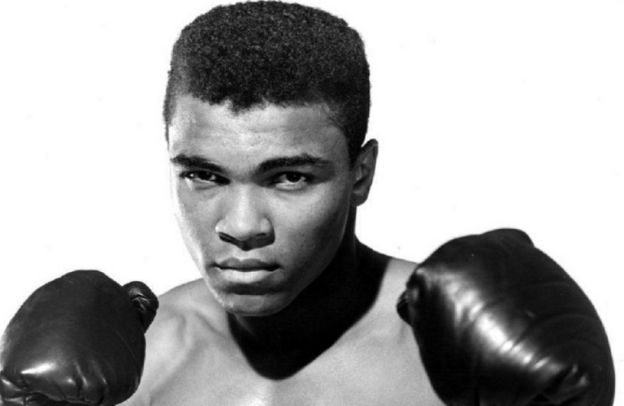Muhammad Ali, American Professional Boxer, and Activist – 1942 To 2016

Muhammad Ali was one of the most phenomenal figures who dominated the world of sports during the 20th century. His 21-year career was characterized by 56 times wins, first among other boxers to have claimed the heavyweight title thrice. Being a force to reckon with, Muhammad Ali got several mentions in top magazines in the United States and further earned the nickname ‘the sportsman of the 20th century.’
Want to learn more about storytelling? Start by downloading the first chapter of The Storytelling Mastery for Businesses.
He was a man who spoke with his fists and determination in all fighting rings, a man who voiced his spite against racism, religion, and politics, making him one of the most controversial figures in the era.
His fierce determination and outspokenness tolled on his career for complete three years, denying him the opportunity to shine brighter during his prime. However, once allowed to venture back into his boxing career and fight, Muhammad continued his display of excellence. Ask any child passionate about boxing who is his muse in boxing, and you will hear Ali’s name pouring out from their lips.
Check out our Life & Legacy Series to read more about similar stories.
An associate actor, writer, trash-talker, and activist, Muhammad Ali made waves around the world during the twentieth century. Despite the ugly grip of sickness that confined him in bed for a long period after he resigned from boxing, Muhammad Ali pursued his philanthropy programs until the cold hands of death embraced him.
His Early Life And Education
Muhammad Ali was born and grew up in a black neighborhood in Louisville Kentucky, so he saw and experienced firsthand the unapologetic racial segregation against his people.
Ali was born on January 17, 1942, as Cassius Marcellus Clay Jr, taking after his father’s name, Clay Sr, who was a billboard and sign painter, and his mother, Odessa Grady Clay, who served as a domestic worker. He had a younger brother, who together with Ali was nurtured by their mother in a Baptist church in Louisville.
Childhood wasn’t a smooth ride for Ali as he developed dyslexia, making it difficult for him to read, much less cooperate freely with other students during his days in school. By the early 1950s, Muhammad Ali attended high school at Central High School, in just about the same neighborhood. The blatant segregation did restrain him as well as his brother from attending the same high school with others.
Circumstances, however, prompted the young Ali into boxing training at the early age of 12. Ali was said to have lost his bicycle which left his tiny heart in pain. On reporting the case to a cop named Joe Martin, Ali made it clear that he would love to throw punches as much as he could on the person who stole his bicycle.
Though it was a statement made from anger, the policeman advised Ali that he would need training before being strong enough to outmatch his opponent. At that moment, his life swerved in a new direction forever. With Martin being a boxing instructor, he took Ali under his care and trained him until he became a master in fists.
Alone in school or at home, Ali capitalized on his time to practice. The constant practice and mastery led to Ali’s participation in several local competitions which marked the beginning of his boxing career.
His Early Career Life
Ali’s protracted training with Joe Martin and Fred Stoner yielded positive results when the young man became strong enough to take down opponents in the ring. Ali made his first amateur debut in 1954 and successfully defeated his opponent in a split decision. Throughout the season, he took on several local championship games emerging victorious.
Ali won about two Golden Gloves titles in Kentucky and two in the national Amateur Athletic Union. During his early years as an amateur boxer, Ali had over 100 wins with just about five losses.
This flurry of victories spurred Muhammed Ali to compete in the 1960 Summer Olympics in Rome at age 18. The six feet, four inches Ali dominated the ring with his sheer size, and with a mix of jabs, speed, and excellent footwork, he took down his opponent, going home with the golden medal for the year.
His Professional Career and Achievements
Ali’s unforeseen victory during the Summer Olympics paved the way for his professional debut the same year, on October 9, 1960, where he won with a sixth-round decision. Subsequently, Ali won several other fights. Despite the victories, Muhammad Ali experienced some difficulties during the start of his professional career.
By 1964, Ali was pitted in a fight against Sonny Liston, who was known to have won others in a fight. Sonny was unlike other fighters that were pitted against Ali. He was built like a bull, that Ali, during their warm-up confrontation before the start of the game called Liston a bear.
The grand defeat of Liston came as a surprise to the audience as people assumed Ali’s tirade before the fight was a result of fear. That grand win marked Ali’s first-ever heavyweight title.
Ali won the title thrice during his career, making him an athletic icon. After his victory during the fight, Ali who had joined the Nation of Islam, converted to Islam. In the earliest days of his conversion, he changed his name to Cassius X but later to Muhammad Ali, owing to his belief that “Cassius Marcellus” was a slave name.
While still wading through the struggles of rising to popularity, the Vietnam War broke out, with Ali refusing to be conscripted in the draft to serve in the United States military during the war. Ali cited his religious beliefs, claiming that he would not fight a war Allah didn’t deem right. He also declined to join the service because of his hatred for whites.
This obvious draft evasion by Ali was acted upon by the government as it was declared a felony. Thus, all athletic commissions in the United States stripped him of his boxing license. Being convicted of a draft evasion crime, Ali was sentenced to five years imprisonment with a fine of $10,000.
By 1970, when the raging war was condemned by most of the people, support for Ali gained momentum, rekindling his lost glory during the years of exile. Ali’s boxing license was reinstated and was acquitted of his crime. On his return that same year, he recounted his excellence by taking out his opponent in the third round.
Muhammad Ali’s Legacy and remembrance
In 1984, Ali received a diagnosis of Parkinson’s syndrome, believed to be linked to the intense head injuries he sustained during his boxing days. As a result, his boxing skills gradually declined, restricting his movement and speech. Despite these challenges, Ali continued to remain visible in the public eye, using his platform to engage in various philanthropic and goodwill initiatives.
His enduring commitment to humanitarian causes led him to travel across the globe, making appearances for charitable purposes. Notably, he engaged in diplomatic efforts, including a meeting with Iraqi leader Saddam Hussein in 1990 to aid in the negotiation for the release of American hostages. Furthermore, in 2002, he took on the role of a United Nations Messenger of Peace, embarking on a journey to Afghanistan to contribute to peace-building efforts.
Throughout these public engagements, Ali’s perseverance in the face of adversity and his unwavering dedication to making a positive impact on the world left a lasting impression on many. Despite the challenges posed by his health, his commitment to serving others continued to inspire people from all walks of life.
Want to learn more about storytelling? Start by downloading the first chapter of The Storytelling Mastery for Businesses.





